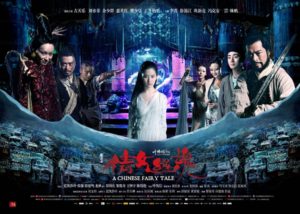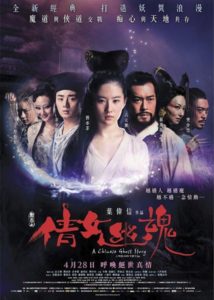A Chinese Ghost Story
倩女幽魂
Hong Kong/China, 2011, colour, 2.35:1, 100 mins.
Director: Ye Weixin 叶伟信 [Wilson Yip].
Rating: 7/10.
Simply bigger and better, on most levels, than the famous 1987 version.
Ancient China. Yan Chixia (Gu Tianle) is a professional demon-hunter in the Black Mountains who falls for beautiful young demon Nie Xiaoqian (Liu Yifei) but cannot bring himself to kill her, even though he realises humans and demons cannot co-exist. However, with the help of fellow demon-hunter Xiaxue Fenglei (Fan Shaohuang), who sacrifices his left arm, he does manage to “imprison” Nie Xiaoqian’s mistress, the Tree Demon (Hui Yinghong), beneath Lanruo temple. Years later, young government official Ning Caichen (Yu Shaoqun) arrives in the area and offers to go up the mountain to find out why the village’s water source has dried up. The village head (Xu  Jinjiang) sends along some prisoners to help him. At Lanruo temple, the prisoners are seduced by two beautiful demons (Lin Peng, Gong Xinliang), who suck out their life energy to pass on to the Tree Demon so she will gather enough strength to escape her bonds. Ning Caichen meets Nie Xiaoqian and falls for her. After unblocking the water source under the temple, Ning Caichen is feted as a hero by the villagers, but returns up the mountain to find Nie Xiaoqian. Meanwhile, however, Yan Chixia has reappeared on the scene and warns him not to get involved with Nie Xiaoqian. And then Xiaxue Fenglei turns up, with his younger sister Xia Bing (Wangdan Yili), both intent on settling the demon question in light of Yan Chixia’s hesitancy.
Jinjiang) sends along some prisoners to help him. At Lanruo temple, the prisoners are seduced by two beautiful demons (Lin Peng, Gong Xinliang), who suck out their life energy to pass on to the Tree Demon so she will gather enough strength to escape her bonds. Ning Caichen meets Nie Xiaoqian and falls for her. After unblocking the water source under the temple, Ning Caichen is feted as a hero by the villagers, but returns up the mountain to find Nie Xiaoqian. Meanwhile, however, Yan Chixia has reappeared on the scene and warns him not to get involved with Nie Xiaoqian. And then Xiaxue Fenglei turns up, with his younger sister Xia Bing (Wangdan Yili), both intent on settling the demon question in light of Yan Chixia’s hesitancy.
REVIEW
Dedicated to the memory of iconic Hong Kong actor-singer Zhang Guorong 张国荣 [Leslie Cheung] – star of the 1987 version, directed by Cheng Xiaodong 程小东 [Tony Ching] and produced by Xu Ke 徐克 [Tsui Hark] – this latest version of the short story by Qing dynasty writer Pu Songling 蒲松龄 (from his collection Strange Stories from a Chinese Studio 聊斋志异) got an undeservedly rough ride from some Hong Kong loyalists on release. But like that earlier version, itself pre-dated by the stagier The Enchanting Shadow 倩女幽魂 (1960) directed by Li Hanxiang 李翰祥 for Shaw Brothers, this A Chinese Ghost Story 倩女幽魂 is absolutely of its era, with production in China, a mixed Hong Kong/Mainland cast, largely Mainland money, and a technical crew (including director Ye Weixin 叶伟信 [Wilson Yip]) from Hong Kong.
At the time, the Cheng/Xu version galvanised audiences with its wire-work, sheer energy, stylistic excesses (all sensual curtains and misty blue light) and Cantonese comedy-romance; nowadays, it all looks rather late 1980s and very cartoonish on the effects side. Almost a quarter-century on, and viewed objectively, this latest version by Ye (SPL 杀破狼, 2005; Ip Man 叶问, 2008) sports tip-top visual effects by South Korea’s Digital Studio 2L, two leads who are just as good as Zhang and Wang Zuxian 王祖贤 [Joey Wang] in a more realistic way, and a storyline that’s far richer in supporting characters and plot.
However, what this version lacks, at least until its climax, is a sense of sweeping emotion, though that’s never been Ye’s strong point. It’s also burdened with a major piece of miscasting in Hong Kong’s Gu Tianle 古天乐 [Louis Koo] as veteran demon-hunter Yan Chixia: though Gu has shown signs recently of developing some character beyond his matinee-idol looks, he simply looks out of place here as a conflicted warrior, especially opposite the excellent Fan Shaohuang 樊少皇 [Louis Fan] as a fellow demon-hunter. Gu’s attempts at stirring some comedy into his conflicted ghostbuster seem awkward compared with the sly touches by veteran Xu Jinjiang 徐锦江 [Elvis Tsui] (who had a small role in the 1987 film) as a pompous village head.
In the Zhang role of an ingenuous government official, Yu Shaoqun 余少群 (so good as the young Mei Lanfang in Forever Enthralled 梅兰芳, 2008) hits the right note of wide-eyed awe, and teams well with fellow Mainlander Liu Yifei 刘亦菲 in Wang’s role. Liu, who made her name as Little Dragon Lady in the superb 2006 TV drama series The Return of the Condor Heroes 神雕侠侣 but also showed a talent for modern rom-com in Love in Disguise 恋爱通告 (2010), is especially good with her multiple mood changes in the early going, though loses some traction as the story progresses. That’s partly because she’s overshadowed later on both by Fan and by veteran action star Hui Yinghong 惠英红 [Kara Hui] (Wu Xia 武侠, 2011), who’s way over the top as her evil mistress, the cackling Tree Demon.
As well as the visual effects, everything else in this 21st-century version is simply bigger and better. Production design by Mai Guoqiang 麦国强 [Kenneth Mak], moving from realistically grungy exteriors to imposingly detailed interiors (such as the main temple set), and equally varied costumes by Wu Baoling 吴宝玲 [Bobo Ng] ground the story and comment directly on the characters, without becoming campy or over-extravagant.
As he showed in Ip Man, and the earlier Juliet in Love 朱丽叶与梁山伯 (2000), Ye has always been an actor’s director even when dealing in mainstream genres, and the film as a whole explores the central theme of the human/demon divide much more. What he (and the film) lacks is the ability to fully let go and sweep an audience off its feet with sheer romantic passion, such as a director like Yu Rentai 于仁泰 [Ronny Yu] was capable of at his best (The Bride with White Hair 白发魔女传, 1993; The Phantom Lover 夜半歌声, 1995).
In the Mainland the film had the English title A Chinese Fairy Tale to get round the SARFT proscription on “ghosts”. The 1987 film also had a limited re-release there on 30 April 2011 in a digitally remastered version. As well as the 1960 Shaw Brothers movie, Pu’s short story has also inspired many other similar ones, including the excellent Taiwan production, Ghost of the Mirror 古镜幽魂 (1974, dir. Song Cunshou 宋存寿), with Shi Jun 石隽 and a young Lin Qingxia 林青霞 [Brigitte Lin] in her first costume role.
CREDITS
Presented by Golden Sun Century (Beijing) Multimedia (CN), Beijing Forbidden City Film (CN), CHS Media (CN), TIK Culture Development (CN), Huaxia Film Distribution (CN), Golden Sun Films (HK), HolyTown Media (CN), Asia Bright Investment (CN). Produced by Golden Sun Films (HK).
Script: Zhang Tan. Photography: Huang Yuetai [Arthur Wong]. Editing: Zhang Jiahui [Cheung Ka-fai], Deng Wentao. Music: Wu Lecheng [Ronald Ng]. Production design: Mai Guoqiang [Kenneth Mak]. Costume design: Wu Baoling [Bobo Ng]. Sound: Ruan Weijiang, Shi Chunmin, Zeng Jingxiang [Kinson Tsang]. Action: Ma Yucheng, Xu Zhongxin, Fan Zhanhong. Visual effects: Im Jeong-hun, Han Tae-jeong (Digital Studio 2L).
Cast: Gu Tianle [Louis Koo] (Yan Chixia), Liu Yifei (Nie Xiaoqian), Yu Shaoqun (Ning Caichen), Hui Yinghong [Kara Hui] (Tree Demon), Fan Shaohuang [Louis Fan] (Xiaxue Fenglei/Thunder), Li Jing (Tie Ya/Iron Teeth), Xu Jinjiang [Elvis Tsui] (village head), Lin Peng (White Snake), Gong Xinliang (Green Snake), Wangdan Yili (Xia Bing), Feng Ke’an (deputy village head), Xu Zhongxin (prisoner), Ma Xiaolong, Zhao Yu, Zhai Quanhui (demon hunters), Sun Lin, He Xun, Lu Yi, Ma Sise, Wang Fei, Jiao Yuqiao (demons), Zhang Yaguo (deputy village head’s niece).
Release: China, 19 Apr 2011; Hong Kong, 28 Apr 2011.
(Review originally published on Film Business Asia, 16 Nov 2011.)
